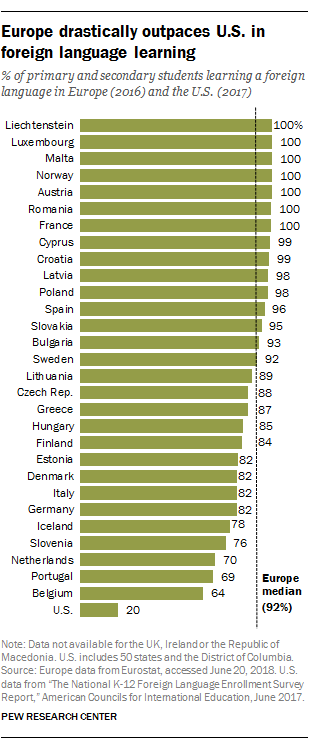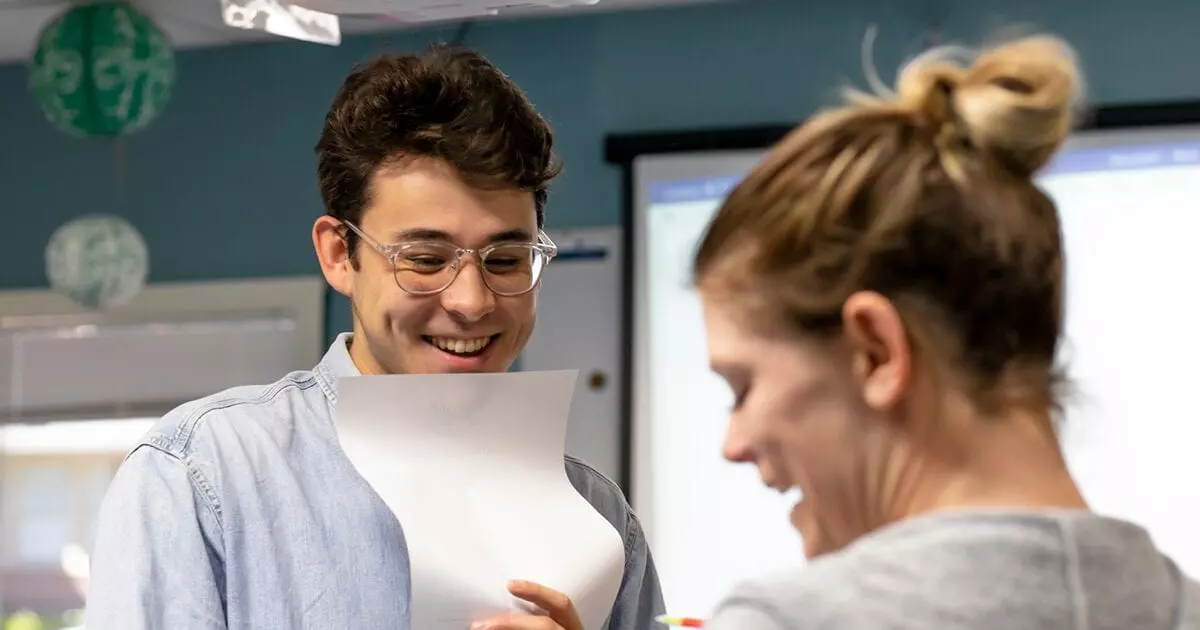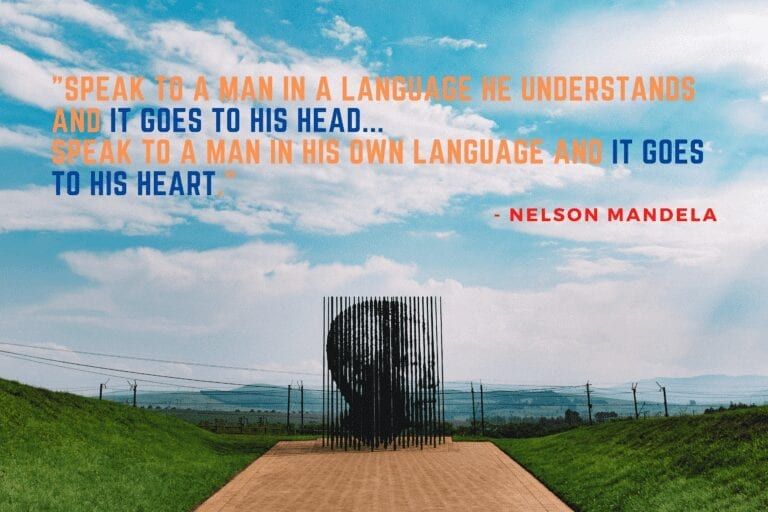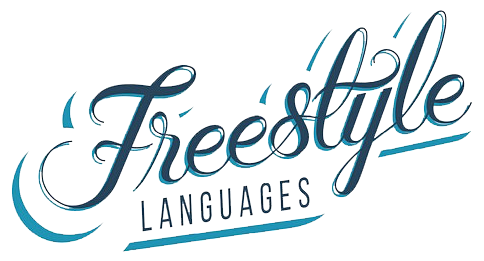Team Freestyle
Top 5 Ways Language Transforms Your Travel Experiences
#5: You won’t be taken for a fool
Learn some faux pas and faux amis too…even basic language learning can give you a step up. Oh la, that American stereotype! Let’s face it most of the world assumes Americans are the last to make an effort with learning a bit of language before we go (a valid assumption, only 1% of Americans speak another language that we learned at school, not including native speakers of other languages…). Not to mention the shock we see on faces when we can actually hold a conversation in their language(s)?! That look alone is worth the price of every language class combined! But… what if? What if a few more of us each year were to take one for the team and show the world we know a thing or two.
Even beginner level, greetings, and pronunciation, all make a huge difference! Did you know…?! A main reason that the French / American interaction starts off…eh, un peu mauvais…is that we haven’t learned, culturally (see below, language & culture go hand-in-hand), the importance of a true ‘bonjour’ to start any greeting or request? C’est simple et c’est vrai. Americans often start with an ‘excusez-moi, pardon, etc…’ by which point the French are already ennuyé, enervé, annoyed. Say Bonjour first (avec un peu d’effort sur l’accent…) et Voila! You’re off on the right foot.
Even beginner level, greetings, and pronunciation, all make a huge difference! Did you know…?! A main reason that the French / American interaction starts off…eh, un peu mauvais…is that we haven’t learned, culturally (see below, language & culture go hand-in-hand), the importance of a true ‘bonjour’ to start any greeting or request? C’est simple et c’est vrai. Americans often start with an ‘excusez-moi, pardon, etc…’ by which point the French are already ennuyé, enervé, annoyed. Say Bonjour first (avec un peu d’effort sur l’accent…) et Voila! You’re off on the right foot.

Photo credit to Pew Research Center
Let’s say you know the basics and are ready to learn ordering in a restaurant, making your way around stores, markets, towns IN that language, you can lower the risk of ‘bêtises’, i.e., saying something stupid or worse completely inappropriate, by putting in some effort into pronunciation skills.
In French and many other languages, we’re usually 1 vowel sound or consonant away from a very embarrassing situation (great for laughs later, mais…)
Want to order the duck (cannard) but don’t know the French twist on nasal vowels? Your waiter may think you’ve called him or somebody an A** or stupid idiot at best (connard). Offensive slang is probably not where you meant to be, but it’s easy to learn!
In French and many other languages, we’re usually 1 vowel sound or consonant away from a very embarrassing situation (great for laughs later, mais…)
Want to order the duck (cannard) but don’t know the French twist on nasal vowels? Your waiter may think you’ve called him or somebody an A** or stupid idiot at best (connard). Offensive slang is probably not where you meant to be, but it’s easy to learn!

How about some faux amis, false cognates. If you’re asking about a ‘preservatif’ in French, you may be asking about condoms, which is good too bien sûr (we’re not judging you mais…)
In Spanish, falsos amigos give us equal, but no less fun, challenge. You might want to tell someone you don’t want to embarrass her and wind up saying, “I don’t want to get you pregnant.” Super great of you, but embarazada is not the same in each language. Do you have a cold? That’s constipado in Spanish. Going into the pharmacy, you may want to know that…
Voila, some vocabulary and pronunciation at any level will be just the empowerment you need to not embarrass – or terrify – your new friends, hosts, waiters, etc…
TIP: Just start. Don’t think you have to become fluent. Basic elementary levels can equip you. Just be sure to work on that accent with Pronunciation Workshops (some great FREE videos here too!) so you can sound more like a native speaker in your travels!
In Spanish, falsos amigos give us equal, but no less fun, challenge. You might want to tell someone you don’t want to embarrass her and wind up saying, “I don’t want to get you pregnant.” Super great of you, but embarazada is not the same in each language. Do you have a cold? That’s constipado in Spanish. Going into the pharmacy, you may want to know that…
Voila, some vocabulary and pronunciation at any level will be just the empowerment you need to not embarrass – or terrify – your new friends, hosts, waiters, etc…
TIP: Just start. Don’t think you have to become fluent. Basic elementary levels can equip you. Just be sure to work on that accent with Pronunciation Workshops (some great FREE videos here too!) so you can sound more like a native speaker in your travels!
#4: Gain new confidence
and radiate it life-long! As with the rest of life lessons, through various learning processes, when we push new boundaries, challenge ourselves, and learn new skills, we’re adding all the more pep to our walk and talk, figuratively and literally. As our new favorite concept in ‘embracing expansiveness’ per another Traverse Journey partner points out: as we are expanding our inner beliefs, living our fullest potential, this leads to experiences that will help us to grow in ways we’ve never imagined.
Humans are made to connect, how great is it to lead yourself to that fullest potential?!
Imagine being able to communicate even enough to order your favorite wine IN French, ask for directions (and understand the fast answers!) when your hopelessly monolingual group is lost, or even understanding some news headlines about what day the train strike in France is expected to end (there goes that side trip to Provence…merci les grévistes!)
Such lived experiences combine to increase your confidence, a life-long benefit.
Humans are made to connect, how great is it to lead yourself to that fullest potential?!
Imagine being able to communicate even enough to order your favorite wine IN French, ask for directions (and understand the fast answers!) when your hopelessly monolingual group is lost, or even understanding some news headlines about what day the train strike in France is expected to end (there goes that side trip to Provence…merci les grévistes!)
Such lived experiences combine to increase your confidence, a life-long benefit.


Somehow I can’t believe that there are any heights that can’t be scaled by a man who knows the secrets of making dreams come true. This special secret, it seems to me, can be summarized in four C s. They are curiosity, confidence, courage, and constancy, and the greatest of all is confidence. When you believe in a thing, believe in it all the way, implicitly and unquestionable. – Walt Disney
What a joy to empower yourself with language, culture, and knowledge of the world. Projecting that confidence helps you gain credibility, deal with life pressures more effectively, and meet personal and professional challenges head-on. Confidence can and will positively affect our school, work, relationships, fitness, the list goes on!
What a joy to empower yourself with language, culture, and knowledge of the world. Projecting that confidence helps you gain credibility, deal with life pressures more effectively, and meet personal and professional challenges head-on. Confidence can and will positively affect our school, work, relationships, fitness, the list goes on!
#3: Up your cultural currency!
Advantage #1: Decrease the risk of culture shock; it’s real! Raise your (digital) hand if you yourself have experienced or have been with somebody who, on a first trip abroad, goes into a completely unrecognizable funk (for lack of a better word…), where on the best of days, they’re moody, grumpy withdrawn, or at a peak, bad case of it, in a full-on panic attack, manifested by frustration and even anger. Ugh, nothing like an adult tantrum to rain on our travel parade!

When faced for the first time with an onslaught of new language both visually, take signs in an airport for example (…oh wait, uscita, that means EXIT in Italian? Go figure I’ve walked way in the other direction…why could it not just say EXIT ?!), and aurally, whether its taxi drivers or market vendors in whatever languages, radio, TV, music, it’s everywhere. Even the technology uses different words (newsflash, it’s NOT all in English…).
All of this overloads our senses unless we’re accustomed to it; and any degree and amount of language, and particularly the culture that comes through language, helps.
Advantage #2: Language learning embeds the most potential for true cross-cultural appreciation.
It’s not new science that the process of language learning at any level (we don’t need to be fluent to get the benefits, we just need to put in some brain work…) promotes and deepens various cognitive, affective and behavior skills, and in particular cross-cultural empathy, defined as “abilities of connecting emotionally with people, showing compassion, thinking in more than one perspective”. ‘Intercultural competence’ emotions are strongly related to self-concept, open-mindedness, non-judgmentalism, and social relaxation.*
In general, positive emotions generate respect for other cultures and their differences, and in a world with dramatic geopolitical differences, we love the potential to affect how you interact with the world.
*Deardorff, D. K. (2009). The Sage handbook of intercultural competence. Thousand Oaks, Calif: Sage Publications.
Advantage #2: Language learning embeds the most potential for true cross-cultural appreciation.
It’s not new science that the process of language learning at any level (we don’t need to be fluent to get the benefits, we just need to put in some brain work…) promotes and deepens various cognitive, affective and behavior skills, and in particular cross-cultural empathy, defined as “abilities of connecting emotionally with people, showing compassion, thinking in more than one perspective”. ‘Intercultural competence’ emotions are strongly related to self-concept, open-mindedness, non-judgmentalism, and social relaxation.*
In general, positive emotions generate respect for other cultures and their differences, and in a world with dramatic geopolitical differences, we love the potential to affect how you interact with the world.
*Deardorff, D. K. (2009). The Sage handbook of intercultural competence. Thousand Oaks, Calif: Sage Publications.


#2 Catapults you to the next language levels
Just while language transforms travel, travel transforms language learning. While pushing personal boundaries, building new skills and confidence, nothing propels your language to the next level better than immersing yourself in your travel experience; the more the better, but trying at any level creates a veritable positive snowball effect! We see it all the time: beginner level students go on a trip, thinking they’d ‘just like some travel language’, and while using their new-found language abilities abroad, they’re able to add such a varied repertoire of vocabulary, expressions, slang, and other ways to express themselves, enriching each experience all the more, they come back not only often skipping a level but with a new goal for proficiency & fluency. Once you experience the world through these deeper connections (ahemmm, see #1 favorite below..), seeing what language does for your experience, why not get yourself more of that? You have the ability to choose more or less immersive-type experiences, or ½ day courses + experiences IN target language. Attend some tours at museums, lectures at local university, take a variety of classes IN the target language: Yoga, painting, cooking… allez!
TIP: Live/stay with a family! Didn’t get to do study abroad during college? It’s never too late!
Get started today with @spanishphraseoftheday, @italianphraseoftheday, and @frenchphraseoftheday!
TIP: Live/stay with a family! Didn’t get to do study abroad during college? It’s never too late!
Get started today with @spanishphraseoftheday, @italianphraseoftheday, and @frenchphraseoftheday!



#1 Connection to people on a deeper level
“Speak to a man in a language he understands and it goes to his head; speak to him in his own language and it goes to his heart”.
Having learned Afrikaans, the language of the oppressor, during his 27 years of imprisonment, Mandela was able to end Apartheid, break down barriers, and, through his remarkable journey, make the world a better, more connected place.
Learning a language is learning the way a person and an entire culture relates to the world. Whatever your life path, whether you’re a politician, doctor, engineer or a creative of any type, the list goes on, we should not underestimate the power of connection to people in another language. Humans are made to connect, and in a world of ever-increasing digitalization, not to mention political polarization, we have the ability to increase our empathy, compassion, and connection.
Having learned Afrikaans, the language of the oppressor, during his 27 years of imprisonment, Mandela was able to end Apartheid, break down barriers, and, through his remarkable journey, make the world a better, more connected place.
Learning a language is learning the way a person and an entire culture relates to the world. Whatever your life path, whether you’re a politician, doctor, engineer or a creative of any type, the list goes on, we should not underestimate the power of connection to people in another language. Humans are made to connect, and in a world of ever-increasing digitalization, not to mention political polarization, we have the ability to increase our empathy, compassion, and connection.

There are no lack of people who think ‘I’m fine not speaking the language, most people speak English (factually incorrect… but that’s beside the point). Is ‘fine’ the marker of the best we want for ourselves and the world around us? Life is short!
TIP: Know that NO age is too late…yes, kids may have an advantage but adults are still extremely good at language learning – even starting much later in life, it’s possible to reach incredibly high levels of mastery.
TIP: Know that NO age is too late…yes, kids may have an advantage but adults are still extremely good at language learning – even starting much later in life, it’s possible to reach incredibly high levels of mastery.
Freestyle Languages
Language learning your way.
